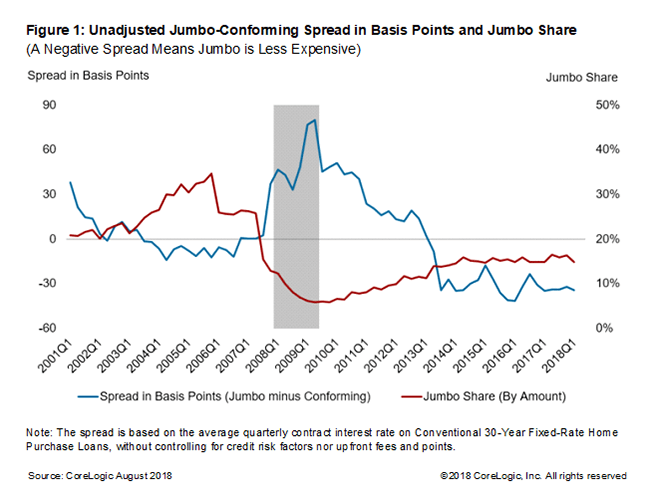Jumbo Loan: Financing Solutions for Homes Above Conforming Limits
Jumbo Loan: Financing Solutions for Homes Above Conforming Limits
Blog Article
Navigating the Jumbo Car Loan Landscape: Vital Insights for First-Time Homebuyers
Browsing the complexities of big finances presents an one-of-a-kind set of obstacles for novice buyers, especially in an evolving genuine estate market. Understanding the necessary eligibility demands and possible benefits, along with the drawbacks, is vital for making informed decisions. In addition, developing a strong financial technique can dramatically improve your leads.
Understanding Jumbo Financings

Since jumbo lendings are not backed by government-sponsored entities, they carry different underwriting standards and call for even more thorough economic documents. This difference can bring about greater rates of interest contrasted to traditional fundings, offered the raised risk to lending institutions. Nevertheless, jumbo finances also use one-of-a-kind advantages, such as the capacity to finance higher-value buildings and potentially more versatile terms.
New property buyers ought to also realize that securing a jumbo car loan usually requires a larger deposit, normally ranging from 10% to 20%. Furthermore, consumers are usually anticipated to show solid credit reliability and a secure earnings to qualify. When checking out jumbo car loan alternatives in their pursuit of homeownership., understanding these subtleties can empower newbie property buyers to make educated decisions.
Eligibility Requirements
Securing a big car loan needs meeting specific eligibility requirements that vary dramatically from those of conventional finances. Unlike traditional financings, which are usually backed by government-sponsored entities, jumbo car loans are not insured or assured, leading to more stringent requirements.
Furthermore, borrowers need to show a durable financial account, which includes a low debt-to-income (DTI) proportion, normally no greater than 43%. This makes sure that borrowers can manage their regular monthly payments alongside other economic obligations.
Moreover, the majority of loan providers need substantial documentation, including evidence of earnings, possession statements, and tax returns for the previous 2 years. A considerable down settlement is likewise essential; while conventional loans might permit down repayments as reduced as 3%, jumbo loans often require a minimum of 20%, depending on the lender and the lending amount.

Benefits of Jumbo Finances
For lots of novice buyers, jumbo car loans provide distinct advantages that can assist in the journey toward homeownership. One of the key benefits is the capability to fund properties that exceed the adhering loan limitations established by government-sponsored entities. This versatility enables purchasers to access a bigger variety of high-value buildings in affordable realty markets.
Additionally, big lendings usually include eye-catching rate of interest that can be lower than those of typical financings, particularly for debtors with solid credit history profiles. This can result in considerable savings over the life of the financing, making homeownership more economical. Additionally, jumbo finances generally enable greater funding amounts without the demand for personal mortgage insurance policy (PMI), which can better decrease month-to-month settlements and general costs.

Potential Disadvantages
Numerous possible property buyers might find that jumbo fundings come with substantial drawbacks that require cautious factor to consider. One of the key concerns is the stringent credentials criteria. Unlike adjusting finances, big finances typically need greater credit rating scores, commonly going beyond 700, and substantial income documentation, making them much less obtainable for some customers.
Furthermore, jumbo car loans generally feature greater interest rates compared to traditional anchor financings, which can cause enhanced regular monthly repayments and total borrowing expenses. This costs might be especially burdensome for new homebuyers who are already browsing the financial complexities of acquiring a home.
An additional significant disadvantage is the bigger deposit need. Several loan providers expect a minimum deposit of 20% or even more, which can position a challenge for purchasers with minimal financial savings. The lack of federal government support for big finances leads to much less positive terms and problems, increasing the threat for loan providers and, consequently, the borrowing prices for house owners.
Finally, market fluctuations can substantially affect the resale worth of premium residential or commercial properties funded with jumbo loans, including an element of economic changability that first-time buyers may find challenging.
Tips for First-Time Homebuyers
Navigating the intricacies of the homebuying procedure can be overwhelming for first-time customers, especially when thinking about jumbo lendings (jumbo loan). To simplify this journey, sticking to some vital approaches can make a considerable distinction
First, inform on your own on jumbo fundings and their certain requirements. Comprehend the different lending requirements, including credit history, debt-to-income ratios, and down settlement assumptions. Usually, a minimal credit report of 700 and a down payment of at least 20% are necessary for authorization.
Second, involve with an experienced mortgage expert. They can give insights customized to your financial situation and help you browse the complexities of the jumbo lending landscape.
Third, think about pre-approval to enhance your acquiring position. A pre-approval letter signals to vendors that you are a major customer, which can be useful in open markets.
Last but not least, do not overlook the relevance of budgeting. Factor in all prices related to homeownership, including property taxes, upkeep, and home owners' insurance policy. By adhering to these suggestions, new purchasers can come news close to the big finance process with higher self-confidence and clearness, improving their possibilities of successful homeownership.
Final Thought
In conclusion, navigating the big lending landscape needs an extensive understanding of qualification standards, benefits, and prospective disadvantages. Eventually, complete prep work and education relating to jumbo loans can lead to even more enlightened decision-making in the homebuying procedure.
When navigating the complexities of the housing market, recognizing jumbo fundings is crucial for newbie buyers intending for residential or commercial properties that read review surpass standard car loan limitations. Big lendings are non-conforming fundings that usually surpass the adapting lending limit set by the Federal Housing Financing Company (FHFA)Furthermore, big financings frequently come with appealing rate of interest rates that can be lower than those of standard finances, specifically for borrowers with strong debt accounts. Big loans generally allow for higher lending amounts without the need for private mortgage insurance (PMI), which can even more reduce monthly payments and total prices.
Unlike conforming lendings, jumbo loans commonly call for greater credit rating ratings, commonly surpassing 700, and substantial income documents, making them less available for some borrowers.
Report this page